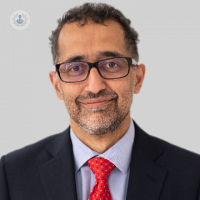Hailey Bieber Stroke - PFO: What is it, and when should it be closed?
Written in association with:Hailey Bieber, a well-known model and celebrity in today’s society, recently suffered a stroke at the mere age of 25. In our latest article, revered London-based interventional cardiologist, Dr Iqbal Malik, reveals just how common it may be to suffer such a traumatic experience at such a young age, and explains what a PFO is, and how it is diagnosed and closed.

Is it common to have a stroke under the age of 25?
It is rare. I would typically categorise anyone who has had a stroke under the age of 55 as young. Over the age of 55 then, people would be considered older and would have a different set or risk factors.
What is a PFO?
A PFO is a flap in the heart that one is born with. In three quarters of people, it seals at birth, and remains open in a quarter of people. If you have a major health condition, such as suffering from a stroke at a young age, then you should be investigated fully to see whether your PFO is open or sealed.
Once we have ruled out other conditions such as irregular heartbeats, sticky blood, clotting disorders, brain tumours, then, if the only thing we can find is a PFO, then the evidence is very strong that we should close it.
How is a PFO diagnosed?
We usually diagnose it with a bubble contrast echo cardiogram. This entails injecting some bubbles into your veins, which go to the right side of the heart, and they should not appear on the left side of the heart. If they do, then you have a PFO, and if you have had a stroke, then we would consider closing it.
How is a PFO closed?
We close a PFO via a needle puncture in the groin, taking a wire across the PFO flap, getting a small plastic pipe on the wire, and through the PFO flap, and then placing what is in fact a double umbrella device to close the PFO. In effect, it involves putting a cuff link in to stop the cuff link from opening up.
Once we have done that, then hopefully the transit of any clot from the right side of the heart to the left side of the heart is reduced. It is usually a day-case procedure, which can normally be done under general anaesthetic. It is normally a very quick procedure, typically taking no longer than 20 minutes.
Dr Iqbal Malik is a highly esteemed and exceptionally skilled and experienced consultant interventional cardiologist who can help you decide if closing your PFO is the right decision for you if your PFO is currently open. Contact him today via his Top Doctors profile to book a consultation.


